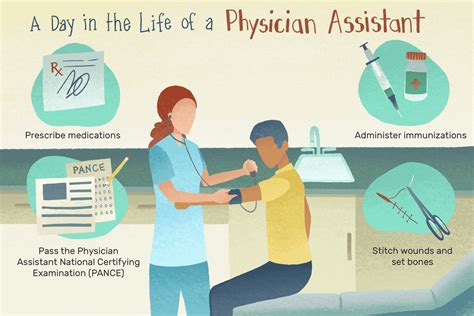Intro
Discover the role of a Physician Assistant (PA) and how they contribute to the healthcare system. Learn about the professions history, education requirements, and scope of practice. Understand the differences between PAs and doctors, and explore the benefits of working with a PA. Get the facts on this vital medical profession.
Physician assistants (PAs) play a vital role in the healthcare system, providing essential medical care to patients while working under the supervision of licensed physicians. As the demand for healthcare services continues to rise, the importance of PAs in delivering high-quality patient care has become increasingly evident. In this article, we will delve into the world of physician assistants, exploring five key facts that highlight their significance, responsibilities, and benefits.
Who Are Physician Assistants?

Key Responsibilities of Physician Assistants
The responsibilities of physician assistants can vary depending on their specialty and work setting, but some common tasks include:- Conducting physical exams and taking medical histories
- Diagnosing illnesses and developing treatment plans
- Prescribing medications and ordering diagnostic tests
- Performing surgical procedures and assisting in operations
- Educating patients on healthy habits and disease prevention
- Collaborating with physicians and other healthcare professionals to provide comprehensive care
How Do Physician Assistants Differ from Nurses and Doctors?

Education and Training Requirements
To become a physician assistant, one must complete a master's degree program in physician assistant studies, which typically takes two to three years to complete. PA programs include both classroom and clinical training, and students learn about various aspects of medicine, including anatomy, physiology, and pharmacology. After graduating, PAs must pass the Physician Assistant National Certifying Examination (PANCE) to become certified.Benefits of Working with a Physician Assistant

- Increased access to medical care: PAs can provide care in underserved areas and help reduce wait times for appointments.
- Personalized attention: PAs often have more time to spend with patients, allowing for more personalized attention and care.
- Cost-effective care: PAs can provide care at a lower cost than physicians, making healthcare more affordable for patients.
- Comprehensive care: PAs are trained to provide comprehensive care, including preventive care, diagnostic testing, and treatment.
Growing Demand for Physician Assistants
The demand for physician assistants is growing rapidly, driven by an aging population and an increased need for healthcare services. According to the Bureau of Labor Statistics, employment of PAs is projected to grow 31% from 2020 to 2030, much faster than the average for all occupations.Specializations and Certifications

- Surgery
- Pediatrics
- Emergency medicine
- Family medicine
- Internal medicine
PAs can also obtain certifications in specialized areas, such as:
- Certified physician assistant (CPA)
- Certified surgical physician assistant (CSPA)
- Certified pediatric physician assistant (CPPA)
Professional Organizations and Resources
Physician assistants can join professional organizations, such as the American Academy of Physician Assistants (AAPA), to stay up-to-date on industry developments and best practices. The AAPA also provides resources and support for PAs, including continuing education opportunities and advocacy efforts.Conclusion and Future Outlook

We invite you to share your thoughts and experiences with physician assistants in the comments below. Have you worked with a PA or have questions about their role in healthcare? Let us know!
What is the difference between a physician assistant and a nurse practitioner?
+While both physician assistants and nurse practitioners provide medical care, the key difference lies in their education, training, and scope of practice. Physician assistants are trained to provide medical care under the supervision of licensed physicians, whereas nurse practitioners are trained to provide independent care in specific areas, such as pediatrics or gerontology.
Can physician assistants prescribe medications?
+Yes, physician assistants are trained to prescribe medications, including controlled substances, under the supervision of a licensed physician. However, the specific scope of their prescribing authority may vary depending on the state and work setting.
How long does it take to become a physician assistant?
+Becoming a physician assistant typically requires completing a master's degree program in physician assistant studies, which takes two to three years to complete. Additionally, PAs must pass the Physician Assistant National Certifying Examination (PANCE) to become certified.
